Earlier this week, with a mid-COVID reopening in the offing, City Cinema launched a new website.
With the flip of that switch ends a 25 year partnership between the cinema’s founder Derek Martin and I, where, under various corporate banners, I coded, managed and hosted the website. This effort, in turn, had its roots in some early website hosting I did for Wormwood’s Dog and Monkey Cinema in Halifax at the very dawn of the public Internet, so there are bits of code here and there that I wrote in 1994 that just kept on working. So, like, old.
If you are eagle-eyed, you can see an early version of the City Cinema website in this Compass clip from 1995:
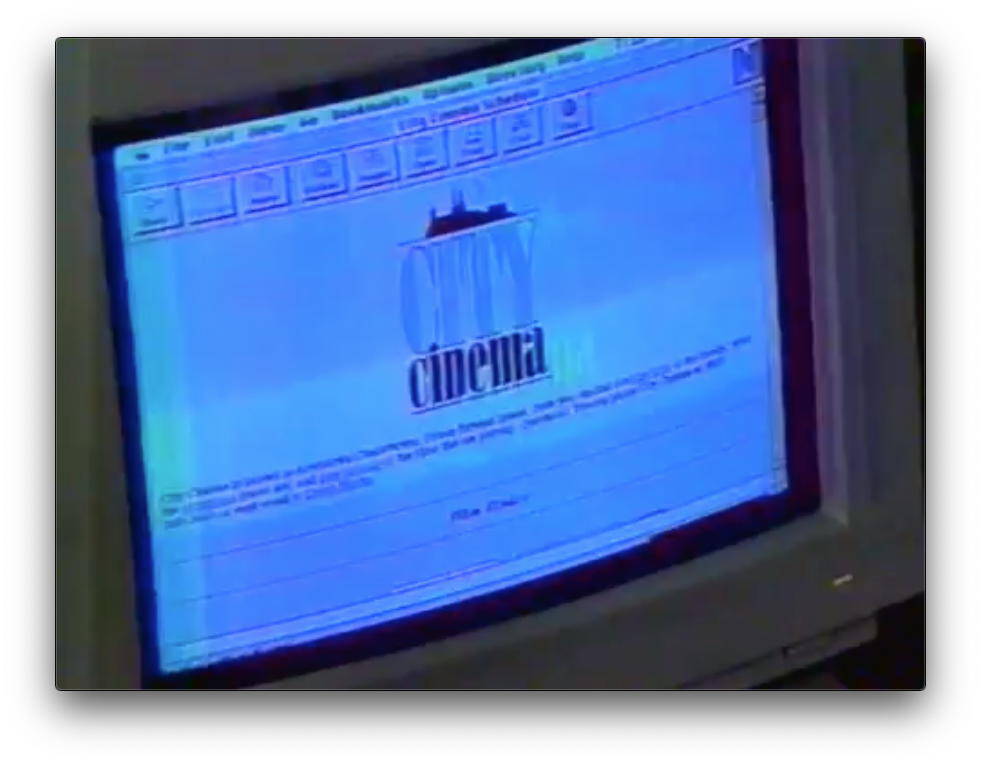
There are versions of the website in the Internet Archive as far back as 1998, back in the days when the site was hosted on the Island Services Network server (days when I didn’t know how to spell Charlottetown, apparently):
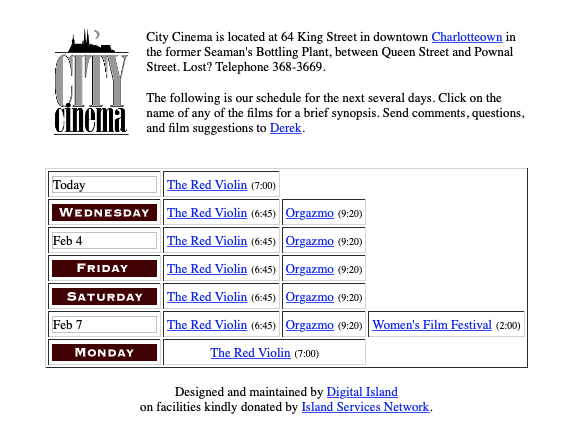
The site’s design evolved over the years, settling into a front-page calendar view of the current month’s schedule around 2001, a design that remained largely unchanged for the following 20 years:
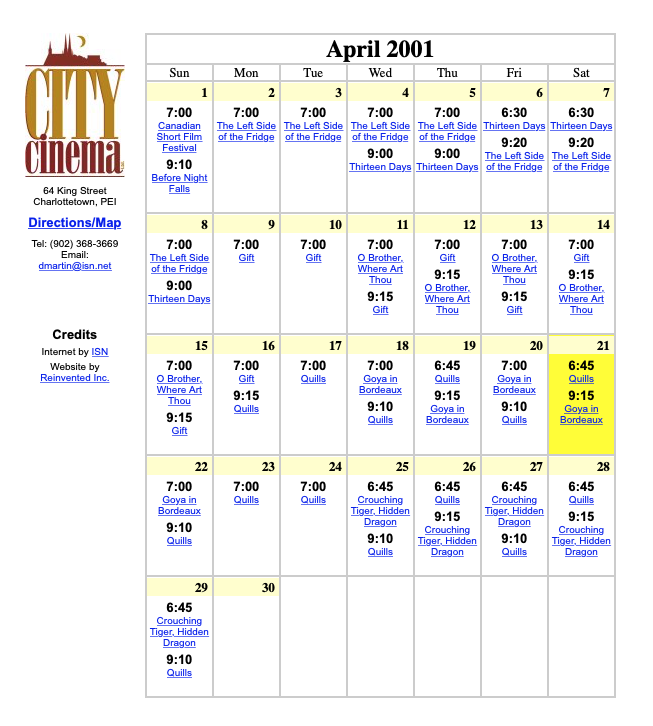
From 2002, when I made the last substantial changes to the code, until this week, when the site went offline, 1,792 films appeared on that calendar–from A Bag of Marbles to Zorba the Greek–and thousands and thousands of online tickets were sold, using much the same PayPal-based payment system throughout, with a few tweaks here and there.
On the back end of all of this was an editor that Derek used to maintain the schedule that got rendered on the website, a simple PHP application that shared a lot in common with applications I built for The Old Farmer’s Almanac and the Province of PEI.
There was a place to enter information about films:
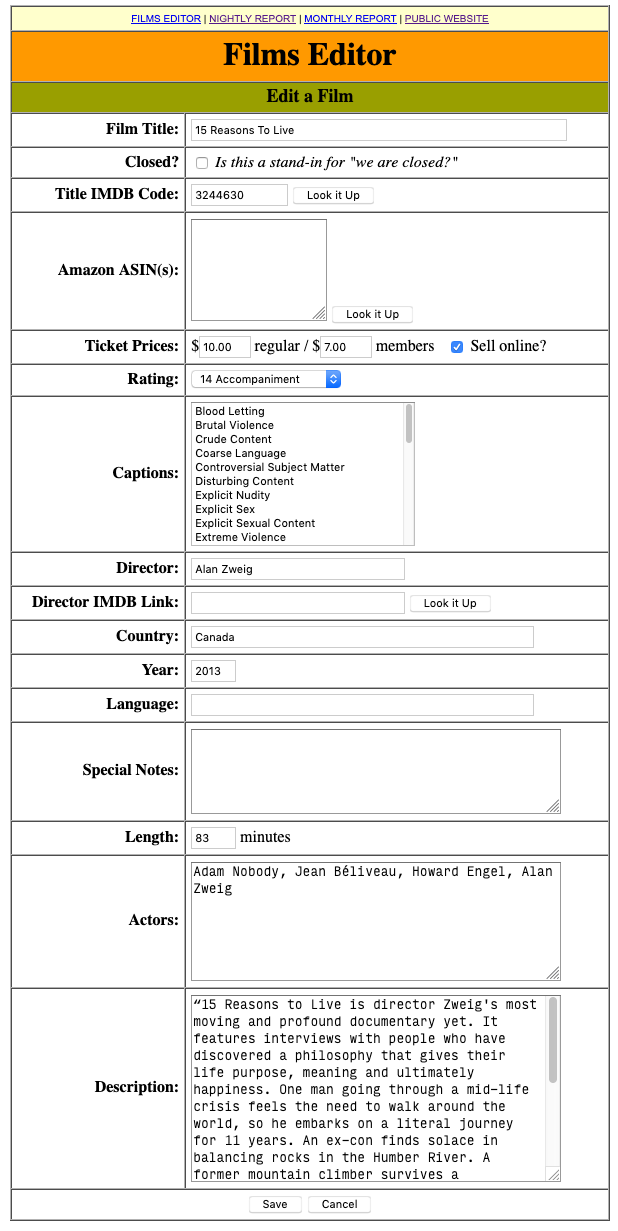
And a place to schedule films, in this case a special showing of Harry Potter and the Sorcerer’s Stone in January:
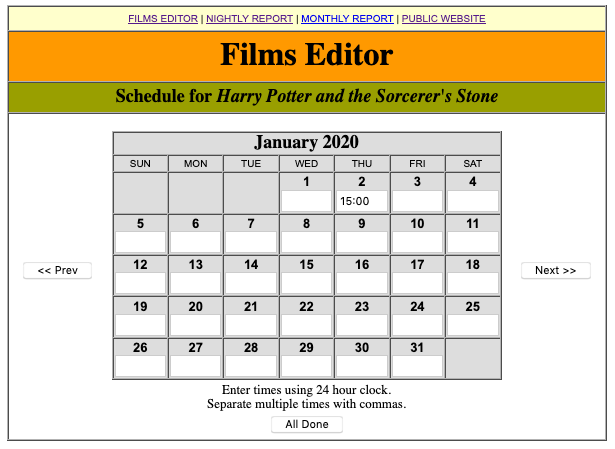
Although the website stayed much the same, I often used City Cinema as a testbed for experimenting with new web technologies. There was an RSS feed, an iCal subscription, a connection to Plazes, a mobile-friendly website, Alexa and Google Home skills, a Twitter bot. It was a fun way to learn about new things, especially things involving dates and schedules.
I’m enormously grateful to Derek for the opportunity: he was as flexible and creative and understanding a client as one could ever hope for.
Over all those years, no money changed hands, making the partnership the longest-standing example of my commitment to working for free.
The Charlottetown Film Society has taken over ownership of City Cinema, and Derek is moving on to new projects, and so our long partnership comes to an end.
Best wishes to City Cinema with its new management and in its new web clothing.
It’s only been a few days that I’ve been feeding myself a diet of “on this day” blog posts, but I’ve already found it enormously helpful.
Not for insight or research or resurfacing old ideas (although there are small touches of that), but simply for stitching together the arc of my last 20 years.
Every night for weeks now I have been watching an episode of the German TV series Dark on Netflix. Dark plays with time and relationships more than any other work of fiction I’ve encountered, and trying to keep track of it all pushes my brain to its limits (while I’m certain Catherine would never abide watching it, as she had no taste for the post-apocalyptic, it sure would help to have her around for that, as that was something she was really good at).
The dramatic fulcrum of Dark is movement back and forth through time on the same day of the year, and that is what my On This Day page (and RSS feed) provide me.
July 15 has a very particular feel to it. So do July 12 and July 13 and, I’m certain, September 17 and November 22.
Being able to wake up on July 15 and smell July 15’s smells and experience July 15’s feel, and then to read myself writing about things I was thinking and feeling on July 15s-past, draws the years closer together, and helps me understand, in a new and visceral way, how my life is proceeding.
I did not expect that, but I welcome it.
Eleven years later I am still delighted by Oliver’s stream of comments on this blog post. That summer we spent in Berlin was magical.
The current guidance here on PEI regarding masks is this:
The PEI Chief Public Health Officer recommends that individuals, who can wear a non-medical mask, should do so, especially indoors when physical distancing cannot always be maintained.
Picking up groceries at Sobeys this afternoon, an environment that clearly qualifies as one where “physical distancing cannot always be maintained,” only about a quarter of shoppers were wearing masks (and, additionally, any pretence of social distancing was abandoned by many).
I don’t understand this.
A month ago, sure, wearing a mask branded you a communist.
But today? It’s normal. It’s standard operating procedure. And the Chief Public Health Officer, much respected and not known for outlandish flights of fancy, has done everything but make it a rule.
Why isn’t everyone wearing a mask?
Several weeks ago my friend Elmine wrote about a notepad emblazoned with Brilliant Ideas, in part:
None of the ideas I wrote down were brilliant. That’s because the branding of this note pad is totally wrong. Ideas are never brilliant. It’s a thing I have to keep reminding myself of every single working day. The brilliance is in the execution.
I was struck by how right she was, and decided to commemorate this in letterpress, creating a “brilliance lies in execution” notepad for Elmine.
The best-laid plans of mice and men often go awry, and my audacious decision to make this a two-colour job failed, with the colour registration all over the place, due a combination of floppy paper, high humidity, and my own inexperience:

After trying my best at this, I realized it was never going to work, and was left with a stack of notepad paper with only the black “brilliance lies in” imprinted.

And so I sent that to Elmine, reasoning, after the fact, it was far more appropriate to allow her to fill her own answer to that prompt, on a case by case basis.
With the type still at the ready, and red ink still on the press, I opted to execute, so to speak, with some lovely Clairefontaine Exacompta index cards (available at The Bookmark), all in red:

Perhaps brilliance lies in both execution and adaptability?
Inspired by Ton’s mention of an on this day page for his blog, I created a similar page for mine: it links to all the posts written on the current day of the current month, back to 1999.
I also created a companion RSS feed: subscribing to this will get you a flow of barrel-aged posts.
Having been at this for 21 years (long enough that I didn’t even think of mentioning it when the anniversary clock ticked over on May 31, 2020), there’s almost 40% of my life reflected in these pages, and thus lots I don’t remember writing, lots I’m vaguely uncomfortable having written (mostly on matter of style or naïvety). But there is also lots to remember.
Many of the posts from the early days suffer from formatting issues, broken images, and so on, and I’ve never come up with a sustainable method for editing them; I’m going to try doing this in 365 chunks, editing each day’s “on this day” posts as best I can to make them ship-shape. I’ll leave broken links that link elsewhere in place, for posterity, but where I can find missing images, or better versions of existing images, I’ll edit the posts and replace them.
Prepare to reminisce.
From our favourite bench in the Gardens of Hope, painted after raspberry pie and iced tea. The Preserve Company has pivoted to encourage picnics in the garden, which seems just about the best way to spend a socially distanced Sunday afternoon.
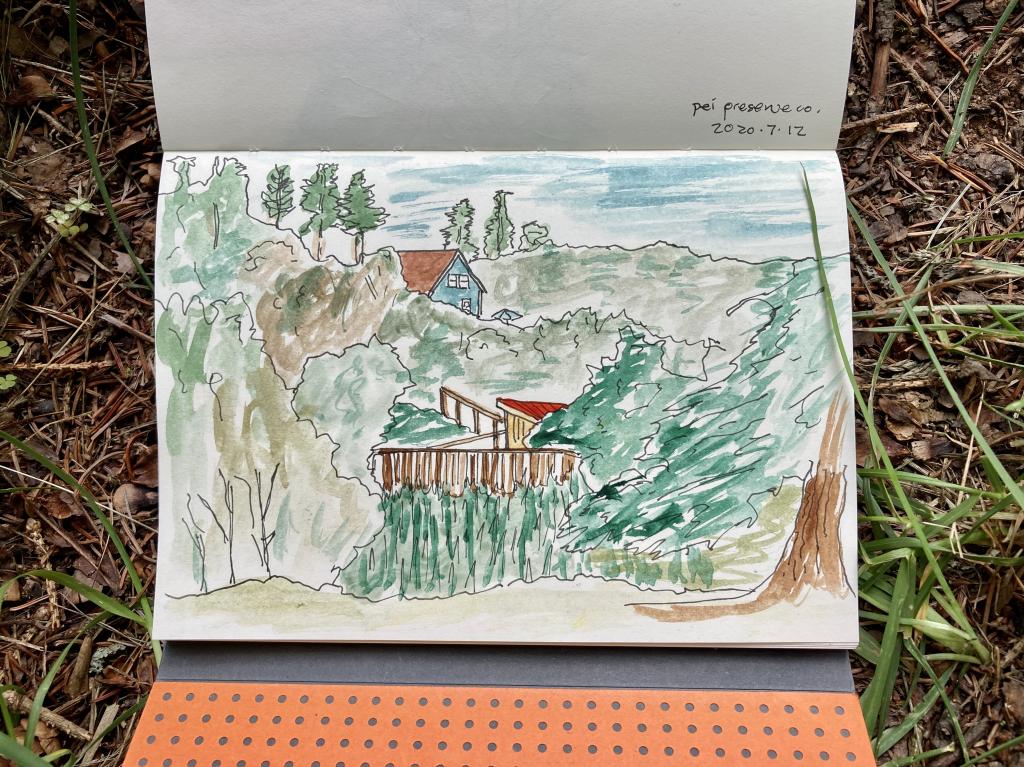
As I move, ever so slowly, toward full-service parenting, new hurdles arise: today’s was cooking meat.
I have been a vegetarian for as long as I can remember, and the last time I purchased meat was perhaps 35 years ago. But circumstances conspired today to require meat to be cooked: Californian niece A. is running the Family Zoom tonight, and we’ve been instructed to come bearing magical potions of our own design.
Oliver, sensing a way over the fence of my fascist vegetable regime, specified that he required burgers for his magic potion.
What was I to do?
I tried pulling the old “surely veggie burgers will do?” routine, but was immediately shut down. So meat it was to be.
Off to KJL we went.
“I’m looking for ground beef,” I announced on arrival.
“How much would you like?”, asked the jaunty young butcher.
Well played, meat boy.
“Two burgers worth, please” I squeaked out, certain he could smell the vegetarian all over me.
I was directed toward the case behind me, where I picked up the smallest possible amount of ground beef. $6.80 worth.
Once home, I had to figure out how not to kill myself or Oliver; visions of Jack Klugman’s Quincy danced in my head: “Looks like a classic case of naïve meat poisoning by a vegetarian, Sam.”
I proceeded to conduct what might be the most hygienic preparation of hamburgers ever: I washed my hands every couple of minutes; I made sure that no surfaces that had meat on them touched anything else, and went immediately into the dishwasher; I cooked the burgers to within an inch of their life, and used a meat thermometer to make sure they were at an appropriate “way more than well done” internal temperature.
Meanwhile, in the backup frying pan, I made myself a Beyond Meat burger.
At this hour, both Oliver and I are still alive, and Oliver reported that the burger was tasty and satisfying. The potion ingredient burger is in the fridge, standing by for later use.
As that might be all the meat cooking I have in me for 2020, if you are moved to take Oliver out for a steak sometime, please be my guest.
Ironically, given the worldwide “go into your houses and do not emerge until at least 2022” feeling in the air, this has been a more social summer than any summer since the early 1990s for me, something facilitated greatly by the installation of the patio umbrella on our back deck. The umbrella turns a previously sun-baked space into a shaded nook, aided greatly by the helpful shady landscaping grown by our northward neighbours.
Because my having-company-over social skills have been left fallow for so long, COVID-19 socializing is not a stretch for me: it just seems normal.
I had a new neighbour over yesterday for tea to talk cycling and wind energy; here’s the setup:

An over-gifting of Sodastream bottles at Christmas has had the unexpected spin-off benefit of allowing me to give each visitor their own chilled bottle of water-with-gas. I got strawberries from Heartbeet Organics on Wednesday, and mindful of the “don’t serve food via buffet” public health rule, we each got our own bowl. I poured the tea; we each got our own milk pitcher. Just off to the right, out of view, was the monster bottle of hand sanitizer.
A good time was had by all.
Perhaps the most motivating call to action I’ve ever had was when a school board official told me and Catherine, in 2014, that “educational assistants are in schools to allow students to survive, not to thrive.” I appreciated their candour in saying this, as it’s this sort of thing that educators will rarely say out loud, even if it’s true. But it was a hard thing to hear, and a hard notion to consider given the number of students whose lives it described.
I used those words when I testified to the Legislative Assembly about the Autism Coordination Act in the fall of 2018, and I’ve referenced them many times when I’ve been advocating for how we need to change our attitude toward allowing our autistic brothers and sisters full citizenship.
The Autism Coordination Act requires that an annual report be tabled to the Legislative Assembly detailing the activities that have taken place under the its umbrella, and the first such report was tabled on July 7, 2020 by Hon. Brad Trivers.
In his introductory message in the report, Minister Trivers finished with this sentence (emphasis mine):
By continuing our collaboration, we can help ensure those with Autism Spectrum Disorder and their families thrive on Prince Edward Island.
Reading the report, it’s clear that there is much to be done: to date much of the work of the Autism Coordinating Committee has been taken up with formalizing itself and getting the lay of the land.
While history gives us many reasons to be skeptical–we were at a similar juncture in 2009 when government’s Autism Action Group released a draft report with a set of recommendations that went largely unrealized–I remain hopeful that this is the start of a revolution of how we embrace autism in this province.
Thrive, not survive, is a good place to start.
 I am
I am